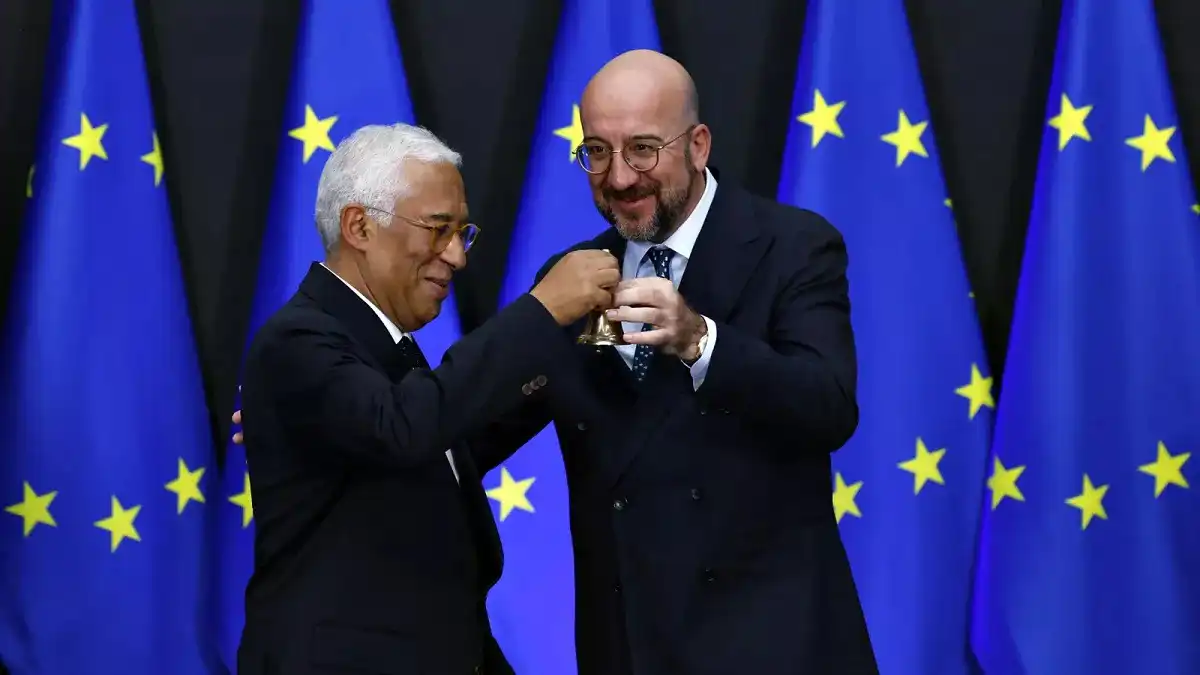António Costa to take office as President of the European Council


António Costa, former Prime Minister of Portugal, is set to take office as President of the European Council on December 1, marking the beginning of a new institutional cycle for the European Union.
Costa succeeds Charles Michel, who handed over the symbolic bell of office in a ceremony on Friday. In his address, Costa underscored the importance of unity and collaboration in addressing the EU’s pressing challenges.
“The only way to be truly patriotic is to ensure sovereignty, to build a common Europe. Because only together can we stand up for security, stability, and peace in our continent,” Costa stated, emphasizing shared prosperity and the climate transition as key goals. “Unity is the lifeblood of the European Union,” he added.
Costa’s tenure, coinciding with Ursula von der Leyen’s new term as President of the European Commission, will last two-and-a-half years with a possible extension. Unlike his predecessor, Costa has pledged to foster a closer working relationship with von der Leyen, who previously had a strained dynamic with Michel.
As President of the European Council, Costa will moderate summits and coordinate political agendas across the 27-member bloc. While the role lacks executive powers, it is pivotal for representation and fostering consensus among EU leaders.
In his speech, Costa portrayed himself as a mediator, advocating for respect towards the diverse perspectives of member states. “We have 27 different histories and cultures, and we look at the world from different geographic locations. That diversity enriches us and is Europe's strength,” he said.
Janis A. Emmanouilidis, deputy chief executive of the European Policy Center, expects Costa to focus on building meaningful compromises that go beyond the lowest common denominator.
Costa identified several priorities, including support for Ukraine, defence policy, migration management, economic competitiveness, and EU budget reforms. He emphasized the importance of a just and lasting peace in Ukraine, rooted in international law.
“Peace cannot mean the peace of a graveyard. Peace cannot mean capitulation. Peace must not reward aggression,” Costa declared, reinforcing the EU’s unwavering support for Ukraine amid the ongoing conflict.
Enlargement of the EU is another critical area Costa intends to address. While he opposes arbitrary deadlines for accession, Costa advocates for advancing negotiations without unnecessary obstacles. He highlighted the geopolitical importance of integrating Western Balkans and Eastern neighbors into the bloc.
Costa aims to streamline EU summits, reducing their duration to one day whenever possible. He also plans to host informal retreats for leaders outside Brussels to discuss pressing issues without the pressure of immediate decisions. The first retreat, focusing on defence and featuring NATO Secretary General Mark Rutte, is scheduled for February 3.
Costa’s appointment is notable as he becomes the first person of colour to hold a top leadership role within the EU. His diverse heritage—his father was half French-Mozambican and half Indian—represents a step forward in the bloc’s commitment to inclusion and diversity.
With a commitment to unity and strategic collaboration, Costa’s presidency marks a new chapter in the European Union’s journey toward addressing its internal and external challenges. (ILKHA)
LEGAL WARNING: All rights of the published news, photos and videos are reserved by İlke Haber Ajansı Basın Yayın San. Trade A.Ş. Under no circumstances can all or part of the news, photos and videos be used without a written contract or subscription.
The Director-General of the World Health Organization (WHO), Dr. Tedros Adhanom Ghebreyesus, has appealed to countries around the world to open their doors to critically ill and injured patients from Gaza.
A new sculpture of former U.S. President Donald Trump, portrayed as a crucified prisoner, has stirred heated debate in Switzerland over the boundaries of art, politics, and faith.
Israeli occupation forces demolished two inhabited Palestinian homes in the town of Qatanna, northwest of occupied Jerusalem, early Thursday morning, leaving dozens of residents homeless.
A tragic accident in New South Wales’ central-west region claimed one life on Thursday morning when a truck struck a disused railway bridge, causing the structure to collapse.